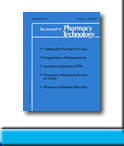 |
 |
IMPACT OF β-BLOCKER DOSAGE CHANGES
DURING HEART FAILURE EXACERBATION
Sara D Brouse and Shideh Hafezi
To request full article click here.
BACKGROUND: Although β-blockers are important life-saving medications in heart failure patients, studies evaluating β-blocker dosing in decompensated heart failure are limited.
OBJECTIVE: To determine the clinical outcomes in patients with severe decompensated heart failure receiving the same dose of β -blockers as well as those whose outpatient regimen was altered.
METHODS: A retrospective chart analysis was conducted in patients with severe decompensated heart failure receiving chronic β-blocker therapy who were admitted to the hospital for decompensated heart failure. Of 245 patients identified, 76 were included in the study: same dose (n = 26), decreased dose (n = 19), discontinued dose (n = 21), or increased dose (n = 10). χ² Analysis for κ-independent samples evaluated the incidence of proarrhythmic events, mortality, and the number of recurrent hospitalizations after the index admission. Stepwise forward linear regression analysis determined the variables correlated with morbidity and mortality in these patients.
RESULTS: New arrhythmias during hospital admission occurred in 19 (25%) patients. The discontinued dose group had the most proarrhythmic events (47.6%; n = 10) and the most deaths (50%) in 6 months. Arrhythmias developed 1.8 and 3 days following β-blocker discontinuation or dosage reduction, respectively.
CONCLUSIONS: Patients who remained on their outpatient β-blocker dose upon admission for decompensated heart failure had better clinical outcomes than others whose β-blocker dose was changed. A prospective, randomized, controlled clinical trial is warranted to further explore the implications of this drug–disease state interaction.
J Pharm Technol 2006;22:79-85.
To request full article click here.
|
|
|
||
|

